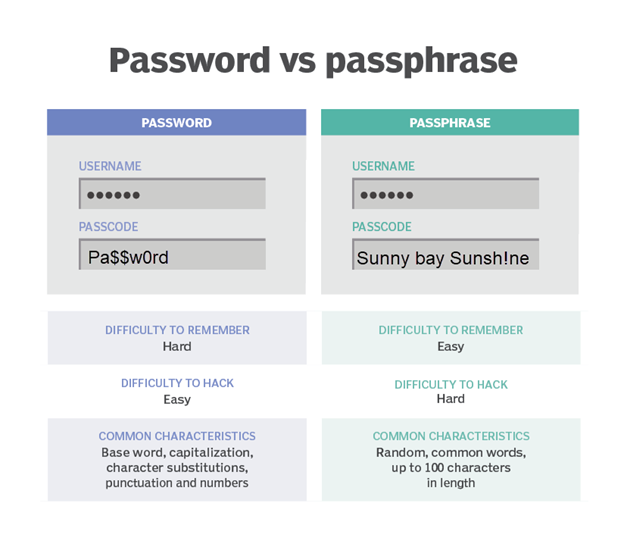Contact
technicalsupport@gulfcoast.edu
850.913.3303
Passphrase
Updated: 10/28/2024
What is a Passphrase?
A passphrase is a sentence-like string of words used for authentication that is longer than a traditional password, easy to remember and difficult to guess or “crack”. Typical passwords range, on average, from eight to 16 characters, while passphrases begin at 16 characters and can reach up to 100 characters or more.

So why is passphrase better than passwords?
- Passphrases are easier to remember than a random of symbols and letters combined together that frequently need to be changed. It would be easier to remember a phrase from your favorite song or your favorite quotation than to remember a short but complicated password.
- Passwords are relatively easy to guess or crack by both human and robots. The online criminals have also leveled up and developed state of the art hacking tools that are designed to crack even the most complicated password.
- Satisfies complex rules easily. The use of punctuation, upper and lower cases in Passphrases also meets the complexity requirements for passwords.
- Major OS and applications support passphrases. All major OS including Windows, Linux and Mac allow pass-phrases of up to 127 characters long. Hence, you can opt for longer passphrases for maximum security.
- Passphrases are next to impossible to crack because most of the highly-efficient password cracking tools breaks down at around 10 characters. Hence, even the most advanced cracking tool won’t be able to guess, brute-force or pre-compute these passphrases.
Passphrase best practices:
Best practices that users can incorporate when creating strong passphrases include
the following:
Use an easy to remember but uncommon group of four to eight words.
- Add spaces within and between words.
- Use capital letters or capitalize certain words.
- Add punctuation and special characters that make sense to the user but no one else.
- Use unusual or abbreviated spellings of words.
- Make some letters into numbers.